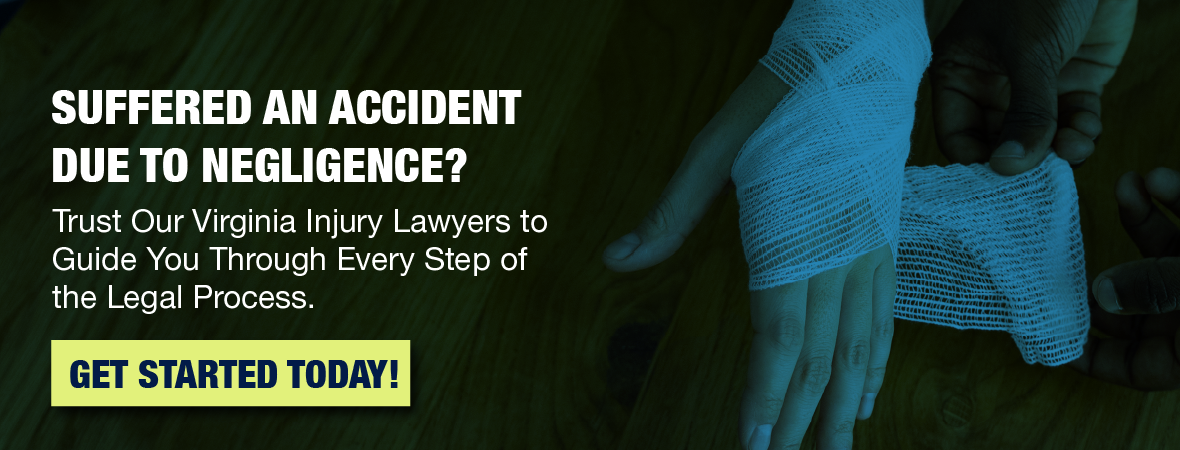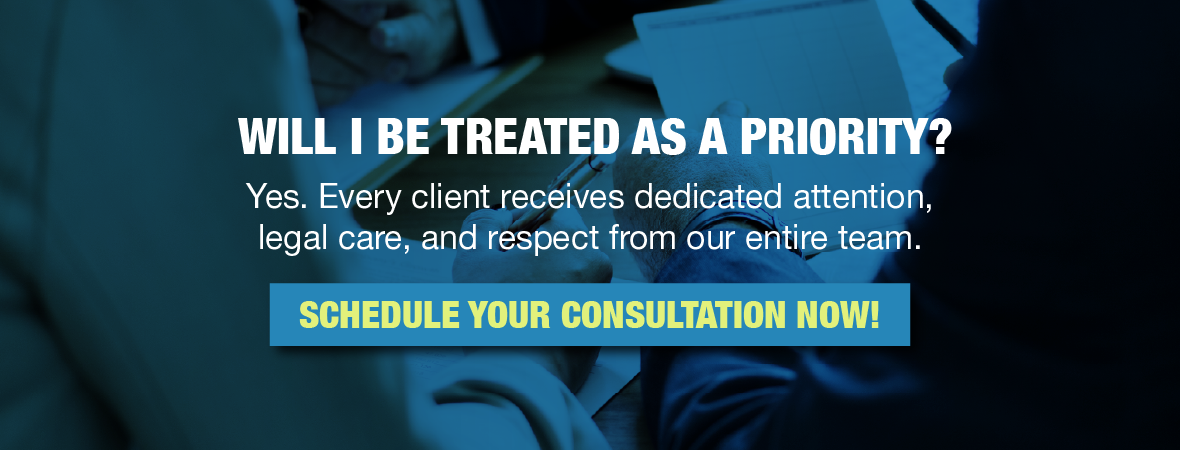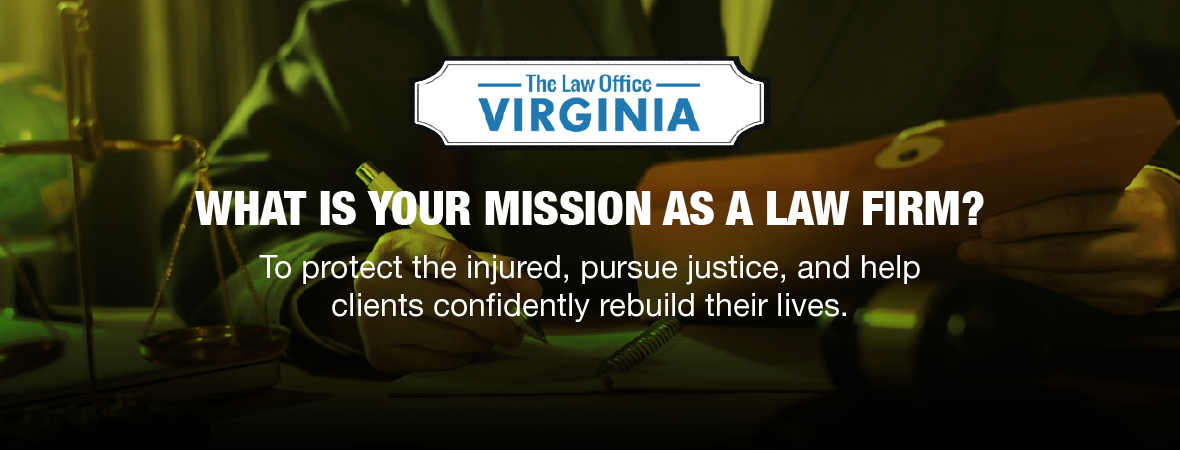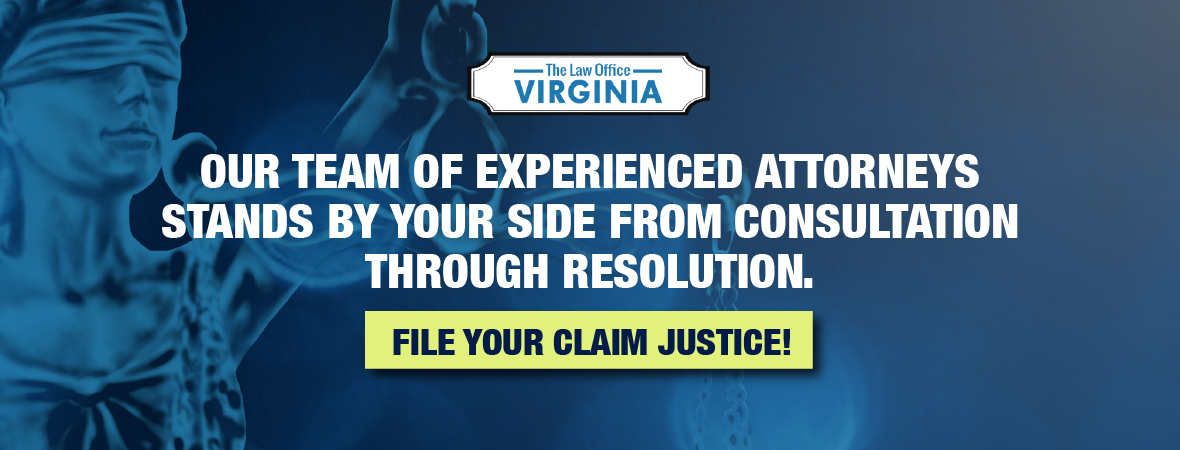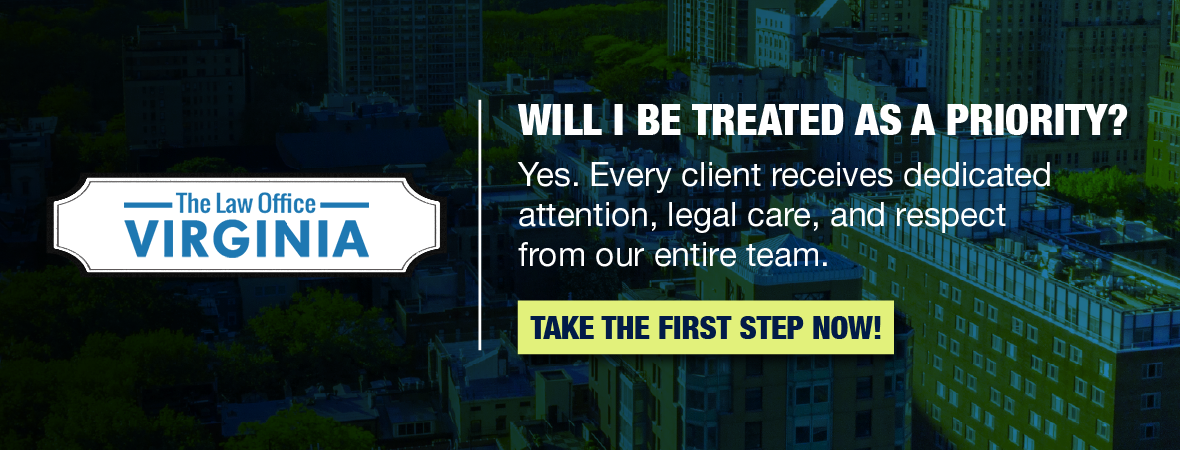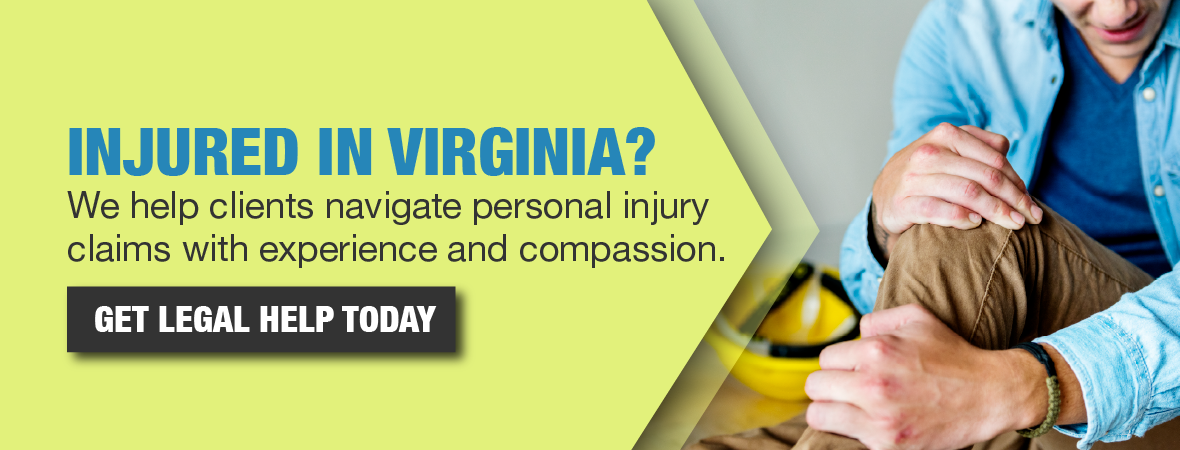Virginia Personal Injury Lawyer: Your Advocate After an Accident
If you’ve been injured due to someone else’s negligence in Virginia, our dedicated personal injury attorneys are here to help. Contact us today for a free consultation and take the first step toward securing the compensation you deserve.
Understanding Personal Injury Law in Virginia
If you or a loved one has been injured due to someone else’s negligence, you may be facing a whirlwind of medical bills, time away from work, and emotional distress. Navigating these challenges can feel overwhelming, especially when you’re unsure of your legal rights or the steps you need to take to protect them. That’s where a personal injury lawyer can help. In Virginia, personal injury law allows victims to seek compensation for injuries and losses caused by the careless or wrongful actions of others. Whether you were hurt in a car crash, suffered a slip and fall, or experienced another type of accident, you may have the right to pursue a legal claim.
Virginia’s personal injury laws are designed to hold individuals and businesses accountable when their actions, or inactions, lead to harm. However, the legal process can be complex. The state follows unique rules, such as a strict two-year statute of limitations and the contributory negligence doctrine, which can prevent recovery if the injured person is even slightly at fault. Because of this, it’s crucial to work with an experienced attorney who understands the nuances of Virginia law and can build a strong case on your behalf.
A skilled personal injury attorney can help you understand your options, gather evidence, negotiate with insurance companies, and, if necessary, take your case to court. With the right legal representation, you can focus on healing while your lawyer focuses on securing the compensation you deserve.
Overview of Personal Injury Law in Virginia
Virginia personal injury law covers a wide range of accidents and incidents that result in harm to individuals. The most common types of personal injury cases in Virginia include:
- Vehicle Collisions: Speeding, distracted driving, and drunk driving continue to be major contributors. In 2023, Virginia Highway Safety Office data reported nearly 7,000 alcohol-related crashes statewide.
- Workplace Accidents: Unsafe environments and insufficient training can lead to serious harm. In 2022 alone, over 45,000 workers in Virginia experienced injuries that required them to miss time or seek medical care, according to Virginia Workers’ Compensation Commission.
- Medical Errors: Mistakes made during diagnosis, treatment, or surgery can lead to devastating outcomes. The National Practitioner Data Bank reports that Virginia sees nearly 200 medical malpractice payouts per year, with average settlements reaching hundreds of thousands of dollars.
- Slip and Fall Accidents: These incidents typically occur on private or commercial property due to unsafe conditions such as wet floors, uneven surfaces, or poor lighting.
- Premises Liability: Property owners can be held liable for injuries caused by unsafe or poorly maintained premises, including dog bites, falling objects, and inadequate security.
- Pedestrian Accidents: Pedestrians struck by vehicles may suffer life-altering injuries, particularly in crosswalks or urban areas with heavy traffic.
- Bicycle Accidents: Cyclists hit by motorists frequently deal with broken bones, head trauma, and other serious injuries.
- Nursing Home Abuse and Neglect: Elderly residents may suffer physical or emotional harm due to inadequate care or intentional mistreatment.
- Wrongful Death: When a person dies due to another’s negligence or misconduct, surviving family members may bring a claim for damages.
Each of these case types is subject to Virginia’s laws on negligence, liability, and damages. It’s important to consult a knowledgeable attorney early in the process to ensure that your rights are protected and your case is handled properly from the start.
Personal Injury Lawyer Virginia Explains The Limits for Claims
In Virginia, there are strict statutes of limitations governing personal injury lawsuits, typically allowing two years from the date of the injury to file a claim, such as in car accidents or slip and falls. Missing this deadline generally bars you from pursuing compensation.
In cases of medical malpractice, the statute is two years from when the injury is discovered or should have been discovered, recognizing that some injuries might not be immediately apparent. This discovery rule can extend the time limit for other injuries as well, allowing claims to be filed within two years from when you became aware of the injury and its cause.
If you fail to file within the statutory limit, your case will likely be dismissed, preventing recovery for damages such as medical bills and lost wages. Therefore, it’s crucial to consult a personal injury attorney promptly after an injury to ensure timely filing and proper legal guidance..
Special Cases and Exceptions
While the general two-year period applies in most cases, there are exceptions and special rules that may apply to your claim. Some of these include:
- Minors: If the injured party is a minor (under the age of 18), the statute of limitations is generally paused until the minor turns 18. This means that the minor has until their 20th birthday to file a personal injury claim.
- Government Claims: If your injury is caused by a government entity, such as a local, state, or federal agency, you may face different deadlines. In Virginia, claims against the government typically require you to provide a notice of claim within a shorter timeframe, usually six months from the date of the incident, rather than the standard two years.
- Wrongful Death Claims: In the unfortunate event of a fatal accident, the statute of limitations for filing a wrongful death claim is generally two years from the date of death, rather than from the date of the accident. This rule allows families to seek compensation for their loved one’s death due to negligence.
- Tolling of the Statute of Limitations: In certain situations, the statute of limitations can be “tolled” or paused. This can occur if the defendant is outside of Virginia and cannot be served with legal papers, or if the plaintiff is incapacitated and unable to pursue a claim due to their injuries.
The Importance of Acting Quickly
The statute of limitations serves as an essential legal protection for both plaintiffs and defendants. For plaintiffs, it ensures that cases are filed while evidence is still fresh and witnesses’ memories are reliable. For defendants, it provides a time limit after which they can no longer be held liable for an incident, offering them some level of certainty.
Acting quickly after an accident is important not only for meeting deadlines but also for strengthening your case. The earlier you begin the process of collecting evidence, speaking with witnesses, and consulting with legal professionals, the better your chances of successfully proving your claim. Additionally, some injuries, such as those related to traumatic brain injuries or spinal damage, may worsen over time, so delaying legal action could jeopardize your recovery.
Types of Injuries and Their Consequences
Not all injuries are visible or heal quickly. Many personal injury victims in Virginia face:
- Traumatic Brain Injuries (TBIs): Often resulting from crashes or falls, TBIs can cause lasting cognitive and motor function issues.
- Spinal Cord Damage: May result in partial or complete paralysis and loss of independence.
- Fractures and Soft Tissue Damage: These are common but can still require surgery and long-term rehabilitation.
- Emotional Distress: PTSD, anxiety, and depression frequently follow traumatic injuries.
According to the CDC, millions of Americans live with long-term effects from TBIs, many of which stem from preventable incidents.
Legal Challenges in Virginia Personal Injury Cases
Virginia is one of the few states that still follows the pure contributory negligence rule. This means that if you’re found even 1% responsible for your own injury, you could be barred from recovering damages. This harsh rule makes having strong legal representation even more critical.
Additionally, Virginia law places a cap on non-economic damages in medical malpractice cases. As of 2023, the cap is $2.6 million and will increase annually until 2031, as detailed by the Virginia Code.
Types of Compensation An Experienced Personal Injury Lawyer Virginia Can Secure Victims
If you have been injured due to someone else’s negligence or wrongful actions in Virginia, you may be entitled to various forms of compensation to cover the damages and losses you have experienced. Compensation in personal injury cases is typically divided into economic damages, non-economic damages, and, in some cases, punitive damages.
That is because personal injury claims are intended not only to compensate for physical injuries but also to address the financial, emotional, and psychological impact that an accident can have on your life. Understanding the types of compensation available can help you make informed decisions about pursuing a claim.
Medical Costs for Past, Present, and Future Treatment
One of the most common types of compensation in a personal injury claim is reimbursement for medical expenses. This includes:
- Past medical bills: Expenses you have already incurred, such as emergency room visits, hospital stays, surgery costs, and medications.
- Ongoing medical treatment: Costs for treatments you are currently receiving, like physical therapy, specialist consultations, and prescription medications.
- Future medical costs: If your injuries require long-term care or ongoing treatment, you may be entitled to compensation for these future expenses. This could include the costs of additional surgeries, rehabilitation, or assistive devices such as wheelchairs or prosthetics.
In certain situations, if your injury leads to a permanent condition, your attorney may assist you in seeking compensation for the long-term medical care you will require, possibly for the rest of your life. Calculating this type of compensation can be complex, which is why it’s essential to work with a skilled personal injury attorney to ensure that all future medical needs are taken into account.
Lost Income and Diminished Earning Capacity
When you are injured, the impact can extend beyond just the immediate medical costs. You may also face a significant loss of income, especially if your injuries prevent you from working for an extended period of time. Lost wages can include:
- Sick days, vacation days, or paid time off that you used during your recovery
- Unpaid leave if your employer does not offer paid time off, or if your leave exceeds available hours
- Lost business profits if you are self-employed or run a business and your injuries prevent you from operating as usual
In addition to lost income, you may also be entitled to compensation for diminished earning capacity. This refers to the long-term impact your injury may have on your ability to earn a living in the future. If your injury causes permanent disability or chronic pain that limits your ability to work in your current profession (or at all), you may be entitled to compensation for the lost earning potential over the course of your career.
For example, if you were once employed in a physically demanding job but can no longer perform those tasks due to your injuries, you may be entitled to seek compensation for the future income you would have earned had you not been injured.
Pain and Suffering, Including Mental Health Impacts
In Virginia, compensation for pain and suffering is an essential aspect of many personal injury claims. This type of damage is intended to compensate you for the physical pain and emotional distress caused by your injury.
Pain and suffering can include the following:
- Physical Pain: This encompasses the discomfort and limitations you experience due to your injuries, including surgeries, recovery time, and ongoing pain.
- Emotional Distress: This refers to the psychological impact of an injury, which may include anxiety, depression, fear, or trauma resulting from the accident or the injury itself.
- Loss of Enjoyment of Life: If your injury prevents you from engaging in activities you once enjoyed, such as hobbies, travel, or social events, you may be entitled to compensation for how this affects your quality of life.
It’s important to understand that while pain and suffering are considered non-economic damages, they often represent one of the most significant portions of a claim. The value of pain and suffering is typically determined by the severity of the injury, the duration of recovery, and the long-term effects on your physical and emotional well-being.
Property Damage
In accidents such as car crashes, property damage is often a significant part of a personal injury claim. This includes:
- Vehicle damage: If your vehicle is damaged or totaled in an accident, you may be entitled to compensation for repairs or the full replacement value of your vehicle if it is beyond repair.
- Personal property damage: If items such as a laptop, phone, or personal belongings are damaged or destroyed in the accident, you may also be entitled to reimbursement for the cost of those items.
Additionally, if the accident caused structural damage to your property, like a home or business, that may also be covered under a personal injury claim. In cases where property damage is extensive, seeking compensation for repair or replacement costs can help alleviate the financial burden of recovery.
Other Possible Forms of Compensation
Aside from the primary categories mentioned above, additional damages may be available depending on the circumstances of your case. These can include:
- Punitive damages: In some rare cases, a court may award punitive damages to punish the at-fault party for particularly egregious behavior, such as driving under the influence of alcohol or drugs.
- Loss of consortium: If your injury affects your relationships with loved ones, particularly your spouse, you may be entitled to compensation for the loss of companionship, affection, and intimacy.
Why Having A Comprehensive Personal Injury Lawyer Virginia Is Important
Every personal injury case is unique, and the compensation you are entitled to will depend on the specifics of your injury and how it has affected your life. Consulting with an experienced personal injury attorney is crucial to ensure that all potential forms of compensation are considered and pursued.
An attorney can help gather the necessary medical records, financial documents, and expert testimony to accurately calculate your damages, both economic and non-economic. Without proper legal guidance, you may risk leaving money on the table or missing out on compensation for losses you hadn’t anticipated.
By working with a knowledgeable attorney, you can be confident that your claim is handled with the care and attention it deserves, maximizing your chances of securing a fair and just settlement or judgment.
Injuries in Public Spaces and Premises Liability in Virginia
Not all personal injury cases occur on the road or in the workplace. Many Virginians sustain injuries in everyday settings such as stores, sidewalks, apartment buildings, or public parks. These incidents often fall under premises liability law, which holds property owners accountable for maintaining safe and hazard-free spaces.
Injuries can result from a slip on a wet floor, a fall caused by poor lighting, or accidents due to inadequate security measures. In Virginia, individuals who are injured must demonstrate that the property owner knew or should have known about the dangerous condition and failed to address it within a reasonable timeframe.
According to the National Floor Safety Institute, falls account for over 8 million emergency room visits each year in the U.S., many of which could be prevented with proper property maintenance.
If you were injured on someone else’s property, it’s crucial to collect evidence promptly. Gathering photos of the scene, witness testimonies, and incident reports can significantly enhance your claim.
The Role of Human Error in Traffic Accidents
Despite advancements in vehicle safety, driver behavior remains the leading cause of collisions on Virginia roads. From speeding and aggressive driving to distraction and fatigue, most accidents are preventable. The National Highway Traffic Safety Administration (NHTSA) estimates that 94% of serious crashes are caused by human error.
Common risky behaviors include:
- Using a phone behind the wheel
- Driving under the influence
- Failing to yield or obey traffic signals
- Driving while tired or emotionally impaired
Understanding these patterns is critical, not just for prevention, but also for proving negligence in a legal claim. Victims often face challenges when insurers argue shared fault, making it essential to work with professionals who can build a case around facts, not assumptions.
Understanding the Impact of Delayed Injuries After a Crash
Not all injuries show up right after a collision. Many people walk away from a car accident feeling “fine,” only to experience pain, stiffness, or neurological symptoms days or weeks later. This is especially common with soft tissue injuries, concussions, or internal trauma.
Unfortunately, delayed symptoms can complicate insurance claims. Some companies may argue the injury wasn’t related to the crash if there’s no immediate documentation. That’s why it’s crucial to:
- Seek medical attention even if you feel okay
- Follow up if symptoms develop
- Keep detailed records of all evaluations and treatments
According to Harvard Health, post-accident pain, especially neck and back injuries, can become chronic if untreated, affecting daily life and the ability to work.
The Hidden Cost of Non-Economic Damages
When people think of car accident claims, they often focus on medical bills or vehicle repair costs. But some of the most significant consequences are harder to measure: emotional distress, anxiety, loss of enjoyment of life, or chronic pain that alters how someone lives day to day.
Virginia law allows for the recovery of non-economic damages, which reflect the full impact of an injury beyond the numbers on a receipt. These may include:
- Physical pain and discomfort
- Emotional suffering and trauma
- Inability to participate in hobbies or family life
- Permanent disfigurement or disability
Although these damages are subjective, they are no less real. A strong personal injury claim includes testimony, medical evidence, and legal advocacy that tells the complete story, not just the physical one.
What to Do After an Injury
Taking the right steps immediately after an accident can make a big difference in your recovery and your legal claim:
- Get medical attention as soon as possible, even if injuries seem minor.
- Report the incident to the proper authorities (e.g., employer, police).
- Document everything, including photos, witness names, and a journal of symptoms.
- Avoid speaking to insurers without legal guidance.
- Contact a lawyer who focuses on personal injury law in Virginia.
Contact a Personal Injury Lawyer Virginia Today
Our team brings deep knowledge of Virginia’s legal system and a client-first approach. We have:
- Handled hundreds of complex personal injury cases successfully
- Recovered millions in compensation for victims of negligence
- A network of expert witnesses and investigators to build strong cases
- The empathy and patience needed to support clients during recovery
If you’ve been injured due to someone else’s careless actions, don’t navigate the legal process alone. Let our experienced Virginia personal injury lawyers help you understand your options and fight for the compensation you’re entitled to.
We work on a contingency fee basis, meaning you don’t pay unless we win your case. Contact us today for a free consultation and take your first step toward healing and justice.
